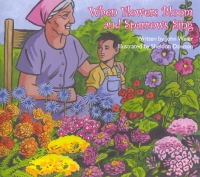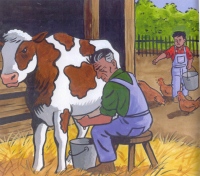| ________________
CM . . .
. Volume XX Number 31. . . .April 11, 2014 
 |
When Flowers Bloom and Sparrows Sing.
John Weier. Illustrated by Sheldon Dawson.
Winnipeg, MB: Pemmican, 2013.
40 pp., stapled pbk., $10.95.
ISBN 978-1-894717-83-0.
Grades 3-5 / Ages 8-10.
Review by Carla Epp.
**1/2 /4
|
| |
|

excerpt:
Tante Madeline sighed; she felt suddenly so tired of all this working. She was tired of the canning and pickling, of skinning, tired of fishing and sewing and cooking. Tired of the sow in the pen and tired of the cow, tired of the garden with its corn and cabbage and carrots. She was tired of the heat and cold, of the mosquitoes that flew from the river to bite her arms and legs in spring. Even her friends and neighbors, and her husband, had begun to notice her impatience. [...] But most of all Tante Madeline felt very tired of working.
When Flowers Bloom and Sparrows Sing is the story of Tante Madeline and her family, Oncle Henri and Cousin Jakey. Tante Madeline is tired, especially of all the work necessary to keep their farm running and their family alive on the edge of the unforgiving Prairie. Tante Madeline begins to dream of her life in the Ukraine before she moved to the Canadian Prairie. She particularly misses the colourful flowers that her mother grew. So one day, Tante Madeline wakes up and decides to change her environment. Her energy is renewed, and she works for days to build a fence through their entire property. She declares that the south side of the fence will, from now on, only be for beautiful things, such as flowers, and following her declaration she only tends her flowers and sits in her garden, forcing Oncle Henri to pick up her share of the farm work. This situation causes enormous stress in their relationship and on Cousin Jakey. Madeline and Henri do not talk for a long time (the story implies months), and eventually Henri retaliates with a fence of his own. It takes an unexpected olive branch to allow for reconciliation and healing in this family.
 This story deals with some very mature themes and may only be suitable for older children or adults. The story deals primarily with Tante Madeline and Oncle Henri, with Cousin Jakey being only a minor player. Children reading When Flowers Bloom and Sparrows Sing may need an adult present to explain some of the issues and history that is referenced in the story. Weier references persecution, struggle for survival, serious emotional marriage issues that can affect children, and Ukrainian Mennonite and Metis history. When Flowers Bloom and Sparrows Sing could be a book that would be useful in bringing these themes to life for children learning about them in the classroom. Weier’s brief explanation at the end of the book about the Bolshevik Revolution is illuminating, but more information like this on the other historical references in the story would be helpful as many of the references may not be common knowledge for children. Earlier, Weier wrote Those Tiny Bits of Beans, which utilized the same main characters, and it may have a fuller description of the family's history. The two books may be intended to be read together, but there is some background missing if When Flowers Bloom and Sparrows Sing is read independently. This story deals with some very mature themes and may only be suitable for older children or adults. The story deals primarily with Tante Madeline and Oncle Henri, with Cousin Jakey being only a minor player. Children reading When Flowers Bloom and Sparrows Sing may need an adult present to explain some of the issues and history that is referenced in the story. Weier references persecution, struggle for survival, serious emotional marriage issues that can affect children, and Ukrainian Mennonite and Metis history. When Flowers Bloom and Sparrows Sing could be a book that would be useful in bringing these themes to life for children learning about them in the classroom. Weier’s brief explanation at the end of the book about the Bolshevik Revolution is illuminating, but more information like this on the other historical references in the story would be helpful as many of the references may not be common knowledge for children. Earlier, Weier wrote Those Tiny Bits of Beans, which utilized the same main characters, and it may have a fuller description of the family's history. The two books may be intended to be read together, but there is some background missing if When Flowers Bloom and Sparrows Sing is read independently.
The language used in the story is colloquial and written as if it were being spoken, thereby giving the story an interesting immediacy. The illustrations are lovely, colorful and bold and really bring the text to life. They bring to life the harsh prairie world that Weier has created and do an excellent job of conveying the characters’ emotions. When Flowers Bloom and Sparrows Sing is likely to be a better purchase for school libraries or libraries where Metis or Mennonite history is in demand.
Recommended with Reservations.
Carla Epp is a librarian with the University of Manitoba in Winnipeg, MB.

To comment
on this title or this review, send mail to cm@umanitoba.ca.
Copyright © the Manitoba Library Association. Reproduction for personal
use is permitted only if this copyright notice is maintained. Any
other reproduction is prohibited without permission.
NEXT REVIEW |
TABLE OF CONTENTS FOR THIS ISSUE
- April 11, 2014.
AUTHORS |
TITLES |
MEDIA REVIEWS |
PROFILES |
BACK ISSUES |
SEARCH |
CMARCHIVE |
HOME |

 This story deals with some very mature themes and may only be suitable for older children or adults. The story deals primarily with Tante Madeline and Oncle Henri, with Cousin Jakey being only a minor player. Children reading When Flowers Bloom and Sparrows Sing may need an adult present to explain some of the issues and history that is referenced in the story. Weier references persecution, struggle for survival, serious emotional marriage issues that can affect children, and Ukrainian Mennonite and Metis history. When Flowers Bloom and Sparrows Sing could be a book that would be useful in bringing these themes to life for children learning about them in the classroom. Weier’s brief explanation at the end of the book about the Bolshevik Revolution is illuminating, but more information like this on the other historical references in the story would be helpful as many of the references may not be common knowledge for children. Earlier, Weier wrote
This story deals with some very mature themes and may only be suitable for older children or adults. The story deals primarily with Tante Madeline and Oncle Henri, with Cousin Jakey being only a minor player. Children reading When Flowers Bloom and Sparrows Sing may need an adult present to explain some of the issues and history that is referenced in the story. Weier references persecution, struggle for survival, serious emotional marriage issues that can affect children, and Ukrainian Mennonite and Metis history. When Flowers Bloom and Sparrows Sing could be a book that would be useful in bringing these themes to life for children learning about them in the classroom. Weier’s brief explanation at the end of the book about the Bolshevik Revolution is illuminating, but more information like this on the other historical references in the story would be helpful as many of the references may not be common knowledge for children. Earlier, Weier wrote